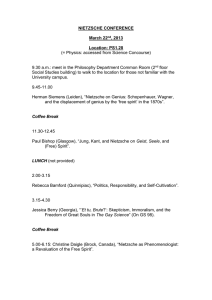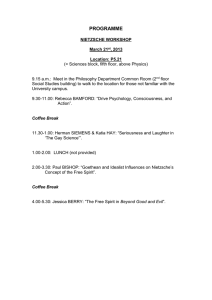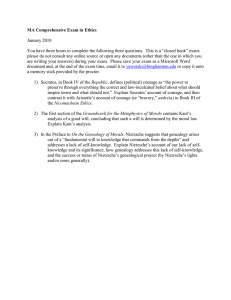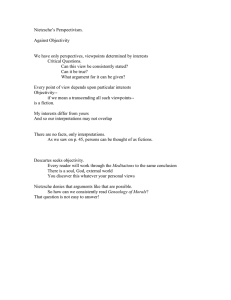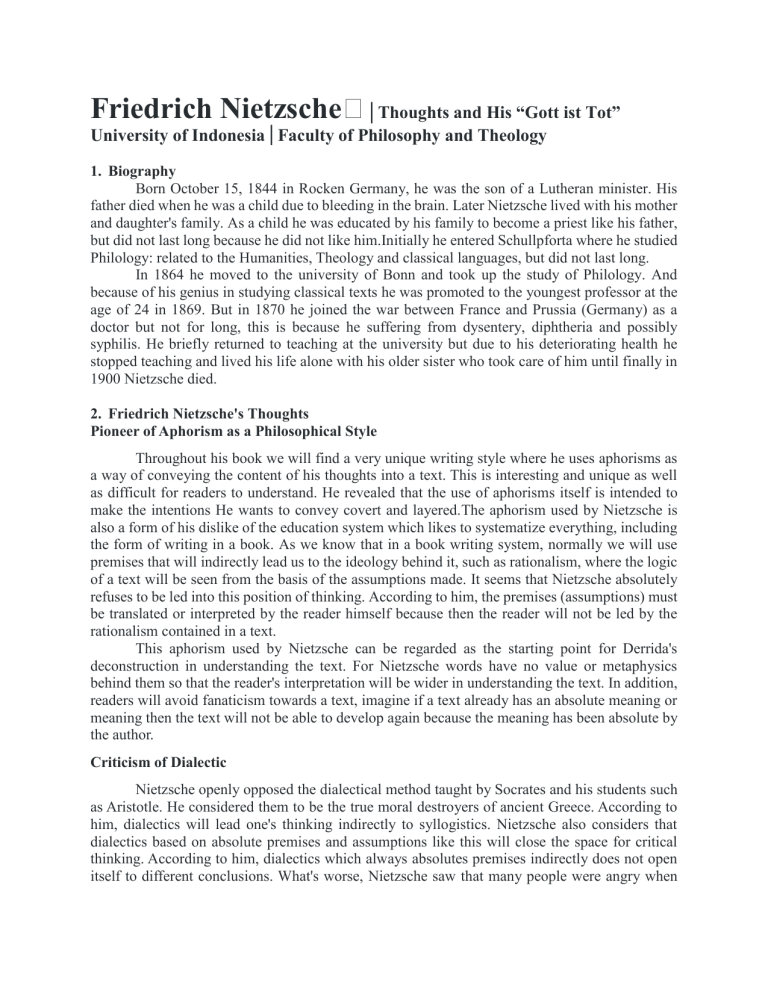
Friedrich Nietzsche️│Thoughts and His “Gott ist Tot” University of Indonesia│Faculty of Philosophy and Theology 1. Biography Born October 15, 1844 in Rocken Germany, he was the son of a Lutheran minister. His father died when he was a child due to bleeding in the brain. Later Nietzsche lived with his mother and daughter's family. As a child he was educated by his family to become a priest like his father, but did not last long because he did not like him.Initially he entered Schullpforta where he studied Philology: related to the Humanities, Theology and classical languages, but did not last long. In 1864 he moved to the university of Bonn and took up the study of Philology. And because of his genius in studying classical texts he was promoted to the youngest professor at the age of 24 in 1869. But in 1870 he joined the war between France and Prussia (Germany) as a doctor but not for long, this is because he suffering from dysentery, diphtheria and possibly syphilis. He briefly returned to teaching at the university but due to his deteriorating health he stopped teaching and lived his life alone with his older sister who took care of him until finally in 1900 Nietzsche died. 2. Friedrich Nietzsche's Thoughts Pioneer of Aphorism as a Philosophical Style Throughout his book we will find a very unique writing style where he uses aphorisms as a way of conveying the content of his thoughts into a text. This is interesting and unique as well as difficult for readers to understand. He revealed that the use of aphorisms itself is intended to make the intentions He wants to convey covert and layered.The aphorism used by Nietzsche is also a form of his dislike of the education system which likes to systematize everything, including the form of writing in a book. As we know that in a book writing system, normally we will use premises that will indirectly lead us to the ideology behind it, such as rationalism, where the logic of a text will be seen from the basis of the assumptions made. It seems that Nietzsche absolutely refuses to be led into this position of thinking. According to him, the premises (assumptions) must be translated or interpreted by the reader himself because then the reader will not be led by the rationalism contained in a text. This aphorism used by Nietzsche can be regarded as the starting point for Derrida's deconstruction in understanding the text. For Nietzsche words have no value or metaphysics behind them so that the reader's interpretation will be wider in understanding the text. In addition, readers will avoid fanaticism towards a text, imagine if a text already has an absolute meaning or meaning then the text will not be able to develop again because the meaning has been absolute by the author. Criticism of Dialectic Nietzsche openly opposed the dialectical method taught by Socrates and his students such as Aristotle. He considered them to be the true moral destroyers of ancient Greece. According to him, dialectics will lead one's thinking indirectly to syllogistics. Nietzsche also considers that dialectics based on absolute premises and assumptions like this will close the space for critical thinking. According to him, dialectics which always absolutes premises indirectly does not open itself to different conclusions. What's worse, Nietzsche saw that many people were angry when the premise was questioned, even though how the conclusion of a thought could change if the premise alone was not disputed. God's Death and All Moral Evaluation Nietzsche for me personally began to change the old moral values when he wrote that 'Gott ist tot' (GOD IS DEAD). In his book, Zarathustra describes how society at that time no longer needed God, because people had started making many 'new gods' in various forms and activities that made people forget God. Then this dead God indirectly eliminates the old moral values. Nietzsche describes society as starting to create new gods in this case during the Age of Enlightenment Science & Positivism and other ideologies. He also invites us to question whether it is true that what is bad is really bad or that what we think is bad has good. He also places himself as immoral in terms of being 'above morals', it can be said that actions are no longer judged from a moral point of view but beyond good and bad morals. Dionysian and Appllorian Morals The terms Dionysian and Apollonian were taken by Nietzsche from the names of the ancient Greek mythological gods, namely Dionysos and Apollo. The god Dionysos is described as a god who is always having fun enjoying life, getting drunk with wine, a god who doesn't care about limits or rules that apply. Dionysos is also depicted as a masked god and a dancing god who always follows his instincts and desires to achieve his happiness. While the god Apollo is a god who symbolizes balance, self-control and knowledge. You could say the god Apollo is the opposite of Dionysos where Apollo is a symbol of obedience to norms and rules. For Nietzsche, the figure of Dionysos is an ideal figure where humans should follow their authentic instincts when dealing with the realities they face on a daily basis. And Nietzsche hates Apollo's mentality which always regulates and makes enforced norms in a society. Ethics Nietzsche argues that each individual human being is basically capable of making ethics about what is morally right and wrong in living his own life. forced on society to implement. For Nietzsche, when people are trapped by other people's ethics that must be obeyed, it will give birth to slavery – physical and psychological slavery and one's thoughts. For Nietzsche ethics is the perspective of each person. So it is a mistake if we impose an ethics on others which incidentally is someone else's perspective. He sees perspective as having a limited style of thinking that cannot be used in all circumstances. Then according to him, when each individual is able to make ethics for themselves about what is good and bad, then there is no such thing as absolute ethics/morals that must be forced on others. That way each individual will be free and no longer burdened by other people's ethics that will hinder his development. Moral Genealogy Moral genealogy is Nietzsche's thought to trace the origins of the formation of a moral that exists in society. This stems from Nietzsche's dissatisfaction with the psychologists of that time who in his eyes failed to explain the origin of morality. Nietzsche argues that these psychologists lacked the zeal of a historian and that the results were unsatisfactory. In the end, Nietzsche invites us to explore the origins of a moral behind which there is a hidden ideology and must be exposed. As mentioned earlier that ethics & morals are perspective only. So of course there are interests behind it that impose ethics & morals that must apply. The Will to Power At the heart of Nietzsche's philosophy is the will to power. Then what is the will to power? In short, the will to power is the desire that arises from a human being to gain power in order to be able to freely create according to the wishes of the individual without being influenced by other people either directly or indirectly through the norms that exist in society. The concept of the will to power is the basis for all of Nietzsche's thinking in psychology, metaphysics and ethics. This will to power for Nietzsche is carried out solely to benefit oneself as a free individual. Ubermensch The ultimate goal of Nietzsche's philosophy is that he wants people to attain ubermensch qualities. For Nietzsche ubermensch is a human quality that is able to escape the demands of society, and is able to escape the illusions imposed by society's morals. An ubermensch is a human being who is able to create his own morality beyond good and bad which is based on his own instincts and experiences in dealing with the realities of the world so as to make him a superior human being and has a mental dionysos or master who is capable and powerful over himself to be able to be creative according to what they want. want. 3. By Friedrich Nietzsche Thus Spoke Zarathustra Beyond Good and Evil On the genealogy of morality The will to power The Antichrist The Gay Science Human, All too Human Twilight of the idols The Dawn of Day and many more. Reference Aschheim, Steven E (1992). The Nietzsche Legacy in Germany, 1890-1990. University of California Press mr Neil at sarinna teacher. p.56. Meyer-Sickendiek, Burkhar, “Nietzsche's Aesthetic Solution to the Problem of Epigonism in the Nineteenth Century”, ed. Paul Bishop, Nietzsche and Antiquity: His Reaction and Response to the Classical Tradition, Woodbridge, UK: Boydell & Brewer, 2004. P. 323. The Cambridge Companion to Nietzsche.(1996). Cambridge University Press. Pg. 129 John Letche. 2001. 50 Contemporary Philosophers. Yogyakarta: Kanisius Bryan Magee. 2008. The Story of Philosophy. Yogyakarta: Kanisius. pp. 172-179.



